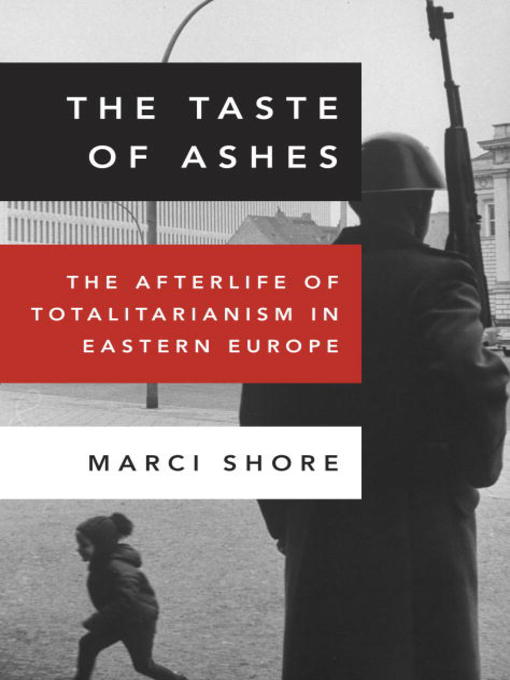
The Taste of Ashes
The Afterlife of Totalitarianism in Eastern Europe
کتاب های مرتبط
- اطلاعات
- نقد و بررسی
- دیدگاه کاربران
نقد و بررسی

December 10, 2012
Shore’s Europe is populated with prostitutes and pimps, street urchins and skinheads; the landscape is “cold and gray... burnt to ashes and rebuilt in Stalinist architecture.” The National Jewish Book Award winner’s newest (after Caviar and Ashes: A Warsaw Generation’s Life and Death in Marxism, 1918–1968) begins and ends with the suicide of a friend, an émigré who returned to Prague only to find that the city he remembered no longer exists, and many of the characters who fill its pages are ghosts—refugees of time and ideology, unable to make peace with the capitalist theme park that replaced their homelands. A historian of the Holocaust and of communism, Shore journeys through Eastern Europe probing the wounds left by the twin disasters of the 20th century. A mix of memoir, travelogue, and philosophical treatise, her book is above all an anthropological study of a people living in a world obscured by cobwebs, more mindful of yesterday than today, where the future cannot be realized until the deaths of all those who witnessed the abyss. The one who makes such observations can only be an outsider, or—in the words of one of Shore’s interlocutors—one who knows “too much and not enough, and nothing.” Challenging and sometimes maddening, but also warm and compassionate, the resulting work is an examination of what it means to live in a society where “the realm of the not possible expansive” and where history, “proceeding inexorably and inevitably,” shapes identity. Agent: Gillian MacKenzie, Gillian MacKenzie Agency.

November 15, 2012
Shore (Intellectual History/Yale Univ.; Caviar and Ashes: A Warsaw Generation's Life and Death in Marxism, 1918-1968, 2006, etc.) gathers reflections of her intellectual journeys through the deeply scarred, still-grieving lands of Eastern Europe from the mid-1990s to the present. The author's various academic studies and research projects brought her to Eastern Europe to study the tensions and contradictions among the intelligentsia of post-totalitarianism. Vaclav Havel called the years after 1968 a time of living "as if," when no one really believed in communism any more, but it was enough to go through the motions "like a dog chained to his house who doesn't want to upset his master." Shore began in Prague, where she traced some of the signatories of the influential Charter 77, a collectively authored text defending human rights as put forth in the Helsinki Accords and which prompted numerous intellectuals in then-Czechoslovakia to be blacklisted for the next decade. She found, rather surprisingly, that many of the former signatories of the charter that had helped bring down the regime in 1989 were former Communist Party members who had hoped a new revolution would bring "socialism with a human face." From Prague, where she took Czech language courses while teaching English, Shore visited Bucharest, where former dissidents of the Ceausescu regime made her aware of unsettling problems with the current democracy and ethnic discrimination. In Warsaw, the author scoured archives of the Warsaw Ghetto uprising and remnants of postwar Jewry as it splintered into communist and Zionist sympathies before being snuffed out by Stalinism. Shore also explored records in Vilnius and Moscow and interviewed survivors and their descendants, offering numerous stories of heartbreak, betrayal and "the impossibility of closure." A fascinating grab bag of the author's dogged research and personal interviews.
COPYRIGHT(2012) Kirkus Reviews, ALL RIGHTS RESERVED.

December 15, 2012
A generation has passed since the overthrow (or perhaps implosion) of the Communist regimes of Central and Eastern Europe. For many in the West, the images seen on television remain vivid and joyful: hopeful Czech students speaking of a new era during their Velvet Revolution, the shocked face of Ceausescu as a supposedly programmed crowd jeers him, and, of course, Germans from both sides of the crumbling wall embracing each other. But, as this brilliant and haunting work proves, the past is neither dead nor buried, especially for those who lived through the Communist era and their descendants. Shore has utilized a wide array of sources, including her own experiences, interviews with party members and ordinary citizens, and government archives. The result is an often devastating portrait of societies struggling to come to terms with their past. Communists and former Communists are sometimes defensive and sometimes remorseful. Former dissidents take pride in their triumph, while youths wonder how their parents could have endured or even participated in such spirit-smothering totalitarianism. This is an an outstanding retrospective.(Reprinted with permission of Booklist, copyright 2012, American Library Association.)

























دیدگاه کاربران